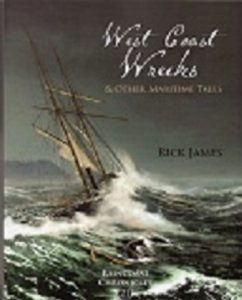My partner’s new book – West Coast Wrecks & Other Maritime Tales – is on the BC Bestseller list!
And he didn’t use any social media to get it there. That’s right, no Facebook, no Twitter, no LinkedIn and no blog. Rick (James) doesn’t even have a website.
So, how did he accomplish this?
Well, it’s a great book to begin with. In twenty-one chapters he explores fascinating tales of shipwrecks, shares the stories of some unique coastal characters and details other noteworthy events in BC maritime history.

- West Coast Wrecks a BC bestseller.
The cover, a commissioned painting by Peter Rindlisbacher depicting the wreck of the Geo. S Wright, is stunning. And the book is Harbour Publishing’s Raincoast Chronicles 21.
Raincoast Chronicles have been popular collector items since Howard White published the first one 39 years ago. But still, West Coast Wrecks had only been out two weeks when it made the BC Bestseller list and hadn’t received any publicity yet.
So, what’s Rick’s secret? He worked his way onto the bestseller list the old-fashioned way.
By chance he happened to be in Victoria soon after the book came out. He visited every book store he could think of, introduced himself and offered to sign copies of West Coast Wrecks.
As a result, many bookstores put ‘Signed by Author’ stickers on the front cover and moved the book to a more prominent display location. Rick repeated the process when he returned home to Courtenay.
Isn’t it thought-provoking to discover that amidst all the social media hype, a little enthusiasm and legwork, coupled with a friendly manner can have such an impact?



 On rough days I liken it to climbing a rock face. Concentrating and knowing where to put my feet and hands (or facts and anecdotes) is critical. At times the top of the mountain seems impossibly far away.
On rough days I liken it to climbing a rock face. Concentrating and knowing where to put my feet and hands (or facts and anecdotes) is critical. At times the top of the mountain seems impossibly far away.![about_the_author_jlb[1]](http://paulawild.ca/wp-content/uploads/2011/08/about_the_author_jlb1.jpg)
![19_image1[1]](http://paulawild.ca/wp-content/uploads/2011/08/19_image11.jpg)